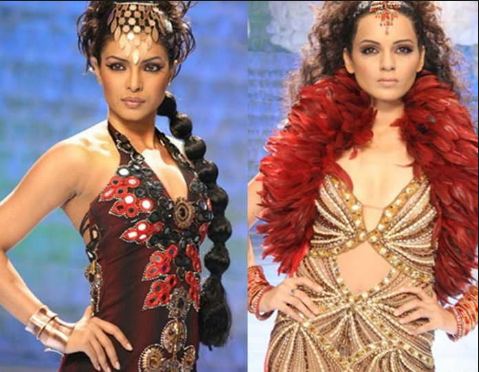Here Is Why Fashion Is Not As Progressive A Film As We Always Thought It To Be

In 2008 when Madhur Bhandarkar’s ‘Fashion’ hit the theatres it was a surprise that we did not know was coming our way. After Chandni Bar and Corporate, Madhur Bhandarkar finished his trilogy with Fashion and even though his earlier works won it accolades like a National Award, Fashion was unexpected in so many ways.
From Priyanka Chopra and Kangana Ranaut’s top-notch performances to put the realities of the big bad world of fashion accurately on screen, Fashion was a path breaker in so many ways. It was a strong woman-oriented film and felt like a progressive film that heralded the coming of age of Bollywood and its changing sensibilities.
However, ten years after the film that won Priyanka her first National Award, things don’t look as bright as they did then. The film which seemed so progressive at that time had some glaring issues at its core that we are in a better position to discuss now than we were 10 years back. Here are a few things about Fashion that seems problematic when you see it 10 years after its release.
Models Have A Troubled Lifestyle Stereotype
This is one stereotype that has been pushed again and again. Yes, fashion can be a tough industry to work in and lifestyles of people working in that industry often take a toll. We all remember the story of Geetanjali Nagpal and no one is negating the fact that these things happen in the big bad world of fashion. But was it really necessary to paint the entire industry with the same broad strokes? For every Geetanjali Nagpal, there are many Mehr Jesias, Dipanwita Sharmas and Namrata Shirodkars who ruled the fashion world at one time but never painted the picture of a troubled lifestyle that spiraled out of control. But in Fashion, both Shonali Gujral and Meghna Mathur and even Janet are models who cannot handle the turbulence of the industry. Janet finds her redemption in marriage and Shonali and Meghna, two ruling models, are the stereotypical models with an excessively turbulent life and of course, terrible love lives.
Blatant Racism
This is one aspect or rather scene of the film which received flak even when it released. Meghna Mathur played by a stupendous Priyanka Chopra realizes she has hit rock bottom in life after she sleeps with a black man. Before this two failed relationships and many other terrible things do not make her as distraught as she is shown to be after she has consensual physical intimacy with a black man. Even the scene is shown in a way that it is meant to make you cringe at the fact that this girl is troubled that she slept with a black man. If this is not blatant racism then we do not know what is!
Gay Fashion Designers Stereotype
For a film that tried to show the fashion industry as it really is, one would expect it to rely less on the most common stereotype. Whether its Sameer Soni, Harsh Chhaya or even Ashwin Mushran, Fashion vehemently push forward the stereotype that all male designers are gay. That would have still been palatable if they were given strong characters that would defy the gay stereotypes but instead what Bhandarkar serves in Fashion is what many people believe to be the ‘cure’ for being gay which is, of course, a heterosexual marriage that takes place between Sameer Soni and Mugdha Godse in the film.
Not As Pro-Women As We Thought
Here is the basic flaw in the core premise of Fashion, it is a women-centric film about strong, ambitious women that discourages one to be strong and ambitious women. Meghna in the film is a small town girl with stars in her eyes who comes to win over the Fashion industry and eventually does so but at the cost of mental sanity and integrity. Parent of every girl from a small town who wants to go big in her life can use Fashion as an example as to why they should let go off their ideas. The core premise of Fashion is bad things happen to good girls in the big bad world which subtly hints at the fact that they are better off not traversing those territories.






